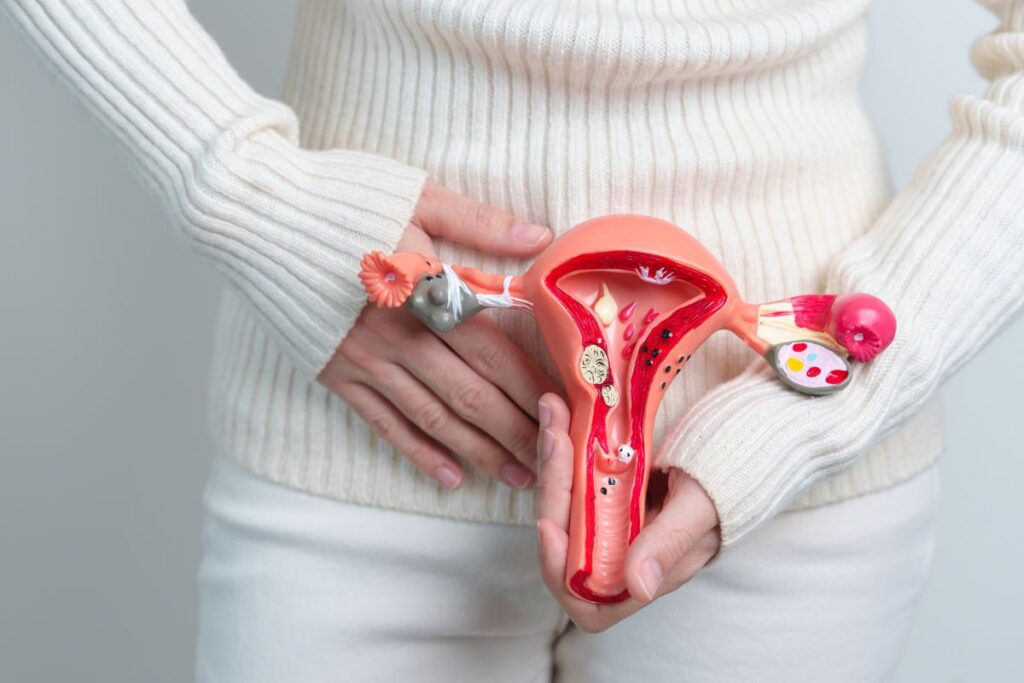Are you having trouble becoming pregnant, experiencing irregular menstrual periods, or excessive hair growth in unwanted places? About 20% of women across the globe suffer from Polycystic Ovarian Syndrome (PCOS), which is indicated by these symptoms. You are not alone if you feel you have been involved in an invisible battle. PCOS can impact your fertility, metabolism, and even your confidence, but with the right knowledge and treatment, it’s possible to regain control. Let’s explore what PCOS is, its symptoms, and how to manage it effectively so that you can live your best life.
What is PCOS?
Uterine fibroids are one of the most common benign tumours in women, and many women don’t even realise they have them until they experience severe symptoms. Have you been experiencing heavy periods, pelvic pain, or frequent urination? These could be signs of fibroids. To help you feel your best again, this article will explain uterine fibroids, their symptoms, and the best ways to treat them.
Uterine Fibroids: What are they?
Non-cancerous growths that appear in or near the uterus are called uterine fibroids. They range in size from tiny, undetectable nodules to massive masses and are composed of muscle and fibrous tissue. Fibroids can affect women of any age but are most common in women aged 30-40 years.
Symptoms of Uterine Fibroids:
● Heavy menstrual bleeding (menorrhagia) and prolonged periods.
● Pelvic pain or pressure.
● Frequent urination or difficulty emptying the bladder.
● Backache or leg pain.
Treatment for Uterine Fibroids:
Treatment options can differ based on how severe the symptoms are and the size of the fibroids.
● Medications: Hormonal treatments like birth control or GnRH agonists can help reduce fibroid size and manage symptoms.
● Surgical Options: For larger or symptomatic fibroids, a myomectomy (fibroid removal) or hysterectomy (removal of the uterus) may be necessary.
● Uterine Artery Embolization: The fibroids shrink as a result of a minimally invasive surgery that stops their blood supply.
Myths About Uterine Fibroids:
1. Myth: “Fibroids are always cancerous.”
● Truth: Uterine fibroids are benign and rarely turn into cancer.
2. Myth: “Having fibroids means you can’t get pregnant.”
● Truth: While fibroids can cause infertility in some cases, many women with fibroids conceive naturally or with fertility treatments.
3. Myth: “Fibroids always need to be removed.”
● Truth: Many women with fibroids experience no symptoms and do not need surgery. Treatment depends on the severity of symptoms. focus on addressing these underlying factors.
FAQ
How do I know if I have fibroids?
The only way to confirm fibroids is through a pelvic ultrasound or MRI. Consult a physician if you suffer from pelvic pain, severe bleeding, or other symptoms.
Can fibroids go away on their own?
Fibroids typically do not go away on their own, but their symptoms can be managed with medication or surgery.
Are fibroids hereditary?
The chances of developing fibroids are increased if you have a close family member who has them. Yes, fibroids tend to run in families.
Can fibroids affect my menstrual cycle?
Because of their effects on the lining of the uterus, fibroids can frequently result in heavy periods or longer menstrual cycles.
Disclaimer:
This article serves solely as a source of information and is not intended to substitute for professional medical advice. It is necessary to consult your healthcare provider for accurate diagnosis and treatment alternatives.
How HealthPil Can Help:
At HealthPil, we offer consultations with experienced gynaecologists who can help diagnose, treat, and manage uterine fibroids. Our experts will work with you to develop the best treatment plan based on your symptoms and health goals.

